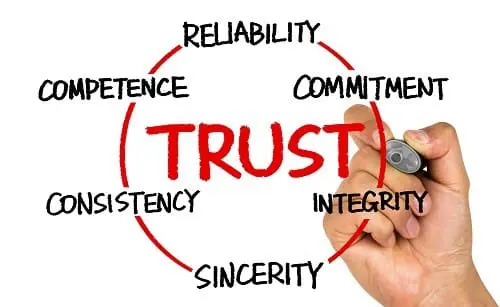
Everyone has something to sell these days. It seems like everywhere we go, we are bombarded by sales pitches. Fill up at a gas station and an ad plays on the pump’s screen. Go to a ball game and you’re surrounded by advertising (even the stadium’s name itself is often an ad). School buses are adorned with placards promoting some product in several cities. Even on vacation, it’s not uncommon now to be approached (even harassed) by someone selling timeshares. It’s becoming inescapable.
But with all these ads and sales pitches, how many do you believe? How many are you certain are simply blowing smoke and trying to part you from your money? When it comes to some selling, whom do you trust?
In the small business world, trust is often everything. Trust can define the difference between success and failure. Break the trust between you and your customers and the next ad you may be running will be an “out of business” one. A big business can often afford to lose a customer or an account. That’s just not the case with a small one. Each customer forms the lifeblood of that business and to lose one, for whatever reason, can hurt. But to lose business because of a breach of trust is a mistake that can prove impossible from which to recover. Therefore, it’s to a small company’s benefit to demonstrate it is worthy of trust from the first interaction with customer to the final transaction.
How can you as a small business owner accomplish this? How can you, with often limited resources, show that your word is like filet mignon in a world full of baloney? Here are a few helpful tips:
During the Sales Process
It’s tough to stay in business with no customers and no sales. That can lead to desperation, and prospects and customers can easily detect that desperation. And they can spot a come-on from a pushy, over-the-top salesperson more interested in meeting a quota and earning a commission rather than in servicing their needs. Don’t be that person.
You and your staff should treat each person who comes in the door as someone seeking your help, not as a potential paycheck. They want a solution to their problem, not a sales pitch. Give them the sales pitch, and they’ll likely walk away. Instead, take a different approach. Rather than talking, lend an ear. Listen to a prospect’s concerns. Offer ideas and solutions rather than products and services. You’re an expert … an advisor … a guide leading them to a way they can accomplish their goals. When a prospect sees you have empathy and a desire to help rather than simply a bunch of dollar signs in your eyes, you can begin to build a trust-based relationship. When you have a trust-based relationship, a client is more apt to listen to you, more inclined to believe what you say, and more likely to take your followup call because they understand your goal is to help, not just sell. You’re serving something of real value, not baloney.
Keeping the Trust After the Sale
Once you’ve gained the customer’s trust and made the sale, your job is not over. Now you must deliver. If you’ve sold your customer a product, it needs to be in their hands, ready to use in a timely manner. That shouldn’t be as big a problem in an age of overnight delivery. If you’re tasked to deliver a service, that service must be performed within the specified timeframe. If not, that needs to be communicated to the client immediately. Keeping customer uninformed or guessing is a surefire way to poison trust and kill any future business. If you’re having problems and can’t deliver what’s promised, be honest, apologize and proactively offer alternatives. No one likes to be in the dark. Honesty, openness and communication smooths a lot of rough patches.
Another way to engender trust and keep it is to stay in touch after the sale. So many companies make the mistake of “selling it and forgetting it.” Make a followup call to the customer to see how things are working. Do they need additional help or training? Perhaps they need an upgrade? You may never know if you don’t ask. Making the call shows your concern about the customer’s well-being and satisfaction. It also keeps the lines open for future business.
Lasting Trust
One important thing to remember, gaining and keeping trust is far different than making a quick sale. It also is more rewarding. A quick sale will likely be a one-time-only shot. By building and keeping a trust-filled relationship, the odds are far stronger that you’ll have a long-term repeat customer eager to do business with you and far more likely to give you the referrals that can grow your company. Why? Because your customer knows you’re serving filet mignon in an age where everyone seems to be dishing out baloney.
- What Is An Invoice Factoring Broker? - July 17, 2022
- 7 Tips for Buying Out a Business Partner or Majority Owner - May 13, 2022
- 6 Leadership Secrets Every Small Business Owner Should Know - December 9, 2021

